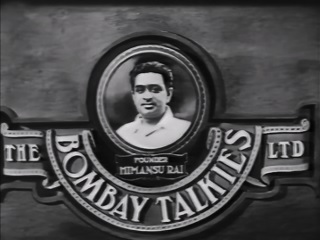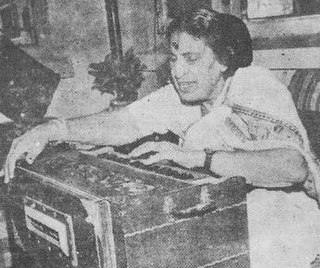
Devika Rani Chaudhuri, usually known as Devika Rani, was an Indian actress who was active in Hindi films during the 1930s and 1940s. She was the first recipient of the Dadasaheb Phalke Award, and was also awarded the Padma Shri. Widely acknowledged as the First Lady of Indian Cinema, Devika Rani had a successful film career that spanned 10 years.

Ashok Kumar, was an Indian actor who attained iconic status in Indian cinema. He was considered the first big star of Indian cinema as well as the first lead actor to play an anti-hero. He also became the first star to reinvent himself, enjoying a long and hugely successful career as a character actor. He was a member of the cinematic Ganguly family. He was honoured in 1988 with the Dadasaheb Phalke Award, the highest national award for cinema artists, by the Government of India. He received the Padma Shri in 1962 and Padma Bhushan in 1999 for his contributions to Indian cinema.

Bombay Talkies was a movie studio founded in 1934. During its period of operation, Bombay Talkies produced 40 movies in Malad, a suburb of the Indian city of Bombay.

Himanshu Rai was an Indian actor and film director. Regarded as one of the pioneers of Indian cinema, he is best known as the founder of the studio in 1934, along with Devika Rani. He was associated with a number of movies, including Goddess (1922), The Light of Asia (1925), Shiraz (1928), A Throw of Dice (1929) and Karma (1933). He was married to actress Devika Rani Chaudhuri (1929–1940).

Sashadhar Mukherjee was an Indian filmmaker in Hindi cinema. He started his career with Bombay Talkies in the 1930s, and later established Filmistan Studio with Rai Bahadur Chunilal, Ashok Kumar and Gyan Mukherjee in 1943. In the 1950s, he went on to start his independent studio, Filmalaya. He is noted for films like Dil Deke Dekho (1959), Love in Simla (1960), Ek Musafir Ek Hasina (1962) and Leader (1964). He is part of the distinguished Mukherjee clan of Bollywood.

Kismet (transl. Fate) is a 1943 Indian drama film, directed by Gyan Mukherjee, written by Mukherjee with Aghajani Kashmeri. It stars Ashok Kumar, Mumtaz Shanti, and Shah Nawaz. The film came with some bold themes for the first time in the history of Indian cinema, showing an anti-hero character with two roles and an unmarried girl getting pregnant.
Niranjan Pal was an Indian playwright, screenwriter, and director in the Indian film industry in the silent and early talkie days. He was a close associate of Himanshu Rai and Franz Osten, with whom he was a founding member of Bombay Talkies.

Achhut Kannya is a 1936 Indian Hindi film. The film deals with the social position of Dalit girls and is considered a reformist period-piece.
Filmistan is an Indian film studio based in Goregaon, Mumbai. Spread over five acres, near Patkar College on S.V. Road, the studio has seven shooting floors, and a temple and garden for outdoor locations. Patkar College's reputation has increased due to this studio. It previously operated as a film production company as well.

Syed Wajid Hussain Rizvi, better known by his film screen name, Agha Jani Kashmiri, was an Indian screenwriter, former actor and Urdu poet.

Saraswati Devi, born Khorshed Minocher-Homji, was an Indian director of music and score composer who worked in Hindi cinema in the 1930s and 1940s. She is most noted for her score, Mein Ban ki Chiriyra Banke Bun Bun Bolun Re in Bombay Talkies's Achut Kanya (1936). She along with Nargis' mother & Sanjay Dutt's grandmother Jaddanbai is considered to be one of the first female music composers in Indian cinema.

Anjaan is a 1941 Indian Hindi-language film directed by Amiya Chakrabarty and produced by Bombay Talkies. It was Chakrabarty's first film direction. The film's story and screenplay were by Amiya Chakrabarty, with dialogues by J. S. Casshyap. The cinematography was by the debutant R. D. Mathur. Its music direction was by Pannalal Ghosh, with lyrics by Kavi Pradeep and P. L. Santoshi. The film starred Devika Rani, who had recently returned to films after a two-year absence, following the death of her husband Himanshu Rai in 1940. The cast included Ashok Kumar, David, V. H. Desai, Gulab, Suresh and Om Prakash.

Gyan Mukherjee was an Indian film director and screenwriter, who worked in Hindi cinema, best known for the hits Jhoola (1941) and Kismet (1943).

Jeevan Prabhat is a 1937 Hindi film social drama, produced by Bombay Talkies and directed by Franz Osten. The music director was Saraswati Devi with lyrics and dialogues by J. S. Casshyap. The screenplay was by Niranjan Pal. The film's "star value" was Devika Rani, with Kishore Sahu making his debut as an actor in the film. The cast included another debutant, Renuka Devi, with Mumtaz Ali, Maya Devi and M. Nazir.
![<i>Izzat</i> (1937 film) 1937 [[British India]] film](https://upload.wikimedia.org/wikipedia/commons/thumb/9/9c/Izzat_%281937%29.jpg/320px-Izzat_%281937%29.jpg)
Izzat (transl. Honour) is a 1937 Hindi film social drama, directed by Franz Osten. The film was produced by Himanshu Rai for Bombay Talkies. The credit roll of Izzat attributes the story to Dr. G. Nundy, adapted for screen by J. Nundy. The screenplay was by Niranjan Pal, who handled the story section of Bombay Talkies. J. S. Casshyap wrote the songs and dialogues and was assisted in dialogue direction by S. I. Hassan. The music was composed by Saraswati Devi, with actor Mumtaz Ali doubling as the choreographer. The film starred Ashok Kumar with Devika Rani in the lead, while the rest of the cast included Mumtaz Ali, Madhurika, Kamtaprasad, Chandraprabha, and P. F. Pithawala.

Savitri is a 1937 Indian Hindi-language mythological film directed by Franz Osten. Adapted from a story in the Mahabharata by Niranjan Pal with dialogues by J. S. Casshyap. The cinematographer was Joseph Wirsching. Saraswati Devi composed the music. According to Garga, Savitri was the "only mythological" produced by Himanshu Rai for Bombay Talkies, who were known for making "rurlist reform dramas". Ashok Kumar and Devika Rani played the lead roles supported by Maya Devi, Saroj Borkar, Mumtaz Ali, and Sunita Devi.
![<i>Vachan</i> (1938 film) 1938 [[British India]] film](https://upload.wikimedia.org/wikipedia/commons/thumb/6/62/Vachan_1938_films.jpg/320px-Vachan_1938_films.jpg)
Vachan is a 1938 costume drama Hindi film directed by Franz Osten. The regular Bombay Talkies writer, Niranjan Pal, walked out of the Bombay Talkies production team after an altercation with Himanshu Rai in 1936. Saradindu Bandyopadhyay, a famous writer known also for creating Byomkesh Bakshi, replaced Pal in the story department, writing for films like Nirmala and Vachan in 1938 and Durga in 1939. The screenplay was by Agha Jani Kashmiri, with dialogues and lyrics by J. S. Kashyap. The music was composed by Saraswati Devi aided by J. S. Kashyap. The film starred Devika Rani and Ashok Kumar, a popular pair from Bombay Talkies who worked in seven films together. Devika Rani remained the bigger star with Kumar's name being "over-shadowed" in the credit rolls, as well as the publicity of the film.

Nirmala is a 1938 Indian Hindi-language social drama film directed by Franz Osten and produced by Bombay Talkies.













![<i>Izzat</i> (1937 film) 1937 [[British India]] film](https://upload.wikimedia.org/wikipedia/commons/thumb/9/9c/Izzat_%281937%29.jpg/320px-Izzat_%281937%29.jpg)

![<i>Vachan</i> (1938 film) 1938 [[British India]] film](https://upload.wikimedia.org/wikipedia/commons/thumb/6/62/Vachan_1938_films.jpg/320px-Vachan_1938_films.jpg)
